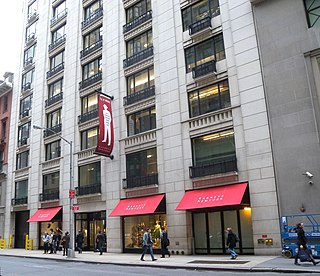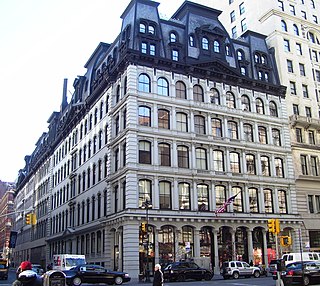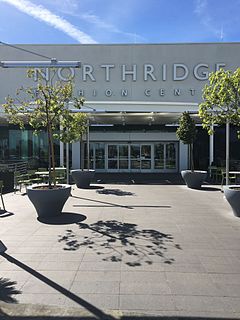Related Research Articles
Lane Bryant Inc. is an American retail women's clothing store chain focusing on plus-size clothing. The company began in 1904 with maternity designs created by Lena Himmelstein Bryant Malsin. As of 2013, the chain consists of 812 stores in 46 U.S. states. Lane Bryant, Inc., is the largest plus-size retailer in the United States. It sells its modestly priced, mostly private-label apparel through a chain of about 700 retail stores and an innovative web site. Half of American women wear a size 14 or larger; Lane Bryant specializes in the style-conscious, 25- to 45-year-old segment of the market. Lane Bryant, Inc. is not affiliated with Lane Bryant catalog, which was spun off as a separate business in 1993.

Bloomingdale's Inc. is an American luxury department store chain; it was founded by Joseph B. and Lyman G. Bloomingdale in 1861. It became a division of the Cincinnati-based "Federated Department Stores" in 1930. In 1994 the Macy's department store chain joined the "Federated Department Stores" holding company. In 2007, "Federated Department Stores" was renamed Macy's, Inc. As of August 1, 2020, there are 54 stores including 34 department stores, 1 furniture/other store and 19 outlet stores with the Bloomingdale's nameplate in operation throughout the United States. Its headquarters and flagship store are located at 59th Street and Lexington Avenue in the New York City borough of Manhattan.

Torrid LLC is an American women's retail chain formerly owned by Hot Topic. While it is still owned by Sycamore Partners, owners of Hot Topic, in 2015 the company branched off to become Torrid, LLC. The store offers plus-size clothing and accessories for women size 10-30. Torrid began operations in April 2001. The first location opened in the Brea Mall in Brea, California. As of 2020, Torrid has over 600 stores in operation across 36 states in the United States. Torrid opened its first store in 2001, and an international store in Canada (Toronto) in August 2015.

Del Amo Fashion Center is a three-level regional shopping mall in Torrance, California, United States. It is currently managed and co-owned by Simon Property Group.

Pacific Sunwear of California, LLC, is a United States-based retail clothing brand rooted in the youth oriented culture and lifestyle of California. The company sells lifestyle apparel, along with footwear and accessories designed for teens and young adults. As of 2020, the company operates 400 stores in all 50 states and Puerto Rico. PacSun is headquartered in Anaheim, California, and operates a distribution center in Groveport, Ohio. The company's regional directors, district managers and store positions are located throughout the United States. The company went bankrupt in April 2016 and is now owned by Golden Gate Capital. This was the company's third time filing bankruptcy.
Burdines was an American chain of department stores operating in the state of Florida, headquartered in Miami. The original store opened in Bartow, Florida in 1896 as a carriage-trade shop. Over its nearly 110-year history, Burdines grew into a popular chain of department stores, known as 'The Florida Store,' decorated with palm trees in the center of the store, painted in pink and blue, and other subtropical colors and motifs. In 1956 the stores became a part of Federated Department Stores, Inc. On January 30, 2004, it was renamed Burdines-Macy's, and a year later, on March 6, 2005, the name Burdines was dropped altogether. The majority of the stores were rebranded as Macy's while a handful closed.

Barneys New York Inc. was an American luxury department store brand, founded in 1923 in New York City. It introduced major luxury brands including Armani, Azzedine Alaïa, Comme des Garçons, Christian Louboutin, Gregory Herman and Ermenegildo Zegna to the US market.

Bonwit Teller & Co. was a luxury department store in New York City founded by Paul Bonwit in 1895 at Sixth Avenue and 18th Street, and later a chain of department stores. In 1897 Edmund D. Teller was admitted to the partnership and the store moved to 23rd Street, east of Sixth Avenue. Bonwit specialized in high-end women's apparel at a time when many of its competitors were diversifying their product lines, and Bonwit Teller became noted within the trade for the quality of its merchandise as well as the above-average salaries paid to both buyers and executives. The partnership was incorporated in 1907 and the store made another move, this time to the corner of Fifth Avenue and 38th Street.

Bullock's was a chain of full-line department stores from 1907 through 1995, headquartered in Los Angeles, growing to operate across California, Arizona and Nevada. Bullock's also operated as many as seven more upscale Bullocks Wilshire specialty department stores stores across Southern California. Many former Bullock's locations continue to operate as Macy's.
Steve & Barry's was an American retail clothing chain, featuring casual clothing, footwear and accessories. By mid-2008, the chain operated 276 stores in 39 states. The company was headquartered in Port Washington, New York. The company liquidated all of its stores throughout 2008 and 2009.

Franklin Simon & Co. was a department store chain specializing in women's fashions and furnishing based in New York City. The store was conceived as a collection of specialty shops rather than a traditional U.S. dry goods store. Each "shop" had a specialty product line, such as ready-to-wear apparel for women, misses, girls, boys, men, young men and infants. When the chain closed in 1979, there were 42 stores.

Northridge Fashion Center is a large shopping mall located in Northridge, Los Angeles, California. It opened in 1971. It was severely damaged during the Northridge earthquake in 1994, but renovated extensively in 1995, 1998, and 2003. The mall's anchor stores are J. C. Penney, two Macy's locations, Pacific Theatres, and a vacant space last occupied by Sears.

Chess King was a United States men's clothing retailer created by the Melville Corporation. From its founding in 1968 it grew to over 500 locations by the mid-1980s, before an eventual decline, sale, and closure of the chain in 1995.
Deb Shops was a catalog and online retailer, formerly a specialty retail chain store in the United States that sold women's clothing and accessories under its own private labels as well as other labels. The company was based in Philadelphia, Pennsylvania and principally served junior and plus-sized women in their early teens through their late twenties. At its peak, Deb Shops operated 337 stores across 42 states. They had moved to become exclusively a plus-size store online, but the website has since ceased to function properly.

Vanity, also known as Vanity Shops, was an American specialty chain of fashion retailers that sold apparel and accessories targeted to fashion-conscious young females, online and in stores. The company was headquartered in Fargo, North Dakota. The fashion retailer’s clothing items ranged in size from zero to 17 with pants inseam lengths of up to 37 inches (940 mm). Vanity filed for bankruptcy and closed its stores in 2017.
Fashion To Figure is a United States retailer focusing exclusively on women's plus-size clothing and related accessories. In November 2017, its parent company B. Lane Inc. filed for bankruptcy.

The retail apocalypse is the closing of numerous brick-and-mortar retail stores, especially those of large chains worldwide, starting around 2010 and continuing onward. In 2019, retailers in the United States announced 9,302 store closings, a 59% jump from 2018, and the highest number since tracking the data began in 2012. Over 12,000 physical stores have closed due to factors including over-expansion of malls, rising rents, bankruptcies of leveraged buyouts, low quarterly profits outside holiday binge spending, delayed effects of the Great Recession, and changes in spending habits. American consumers have shifted their purchasing habits due to various factors, including experience-spending versus material goods and homes, casual fashion in relaxed dress codes, as well as the rise of e-commerce, mostly in the form of competition from juggernaut companies such as Amazon.com and Walmart. A 2017 Business Insider report dubbed this phenomenon the "Amazon effect," and calculated that Amazon.com was generating greater than 50% of the growth of retail sales.
Lillie Rubin was a chain of women's clothing shops in the United States, from the 1946 until 1999.

Judy's was a chain of clothing stores, based in Van Nuys, Los Angeles. Marcia Israel founded Judy's in 1946 and ran it until 1989 when she sold it to Laws International of Hong Kong for $31 million. Israel-Curley died in 2004.
References
- 1 2 Walker, Constance (August 6, 1990). "York served as home to stores' idea". York Daily Record. Retrieved March 1, 2020.
- ↑ "Opening Presentation OF FAMOUS Ormond Silk Stockings". The Daily Mail. July 15, 1932. Retrieved March 1, 2020.
- ↑ "Ormond Solves Your Stocking Problems". The News. April 7, 1933. Retrieved March 1, 2020.
- ↑ "NEW LOCATION FOR THE ORMOND SHOP". The Gazette And Daily. May 29, 1934. Retrieved March 1, 2020.
- ↑ "Ormond Shop at York Mall". Sunday News. October 13, 1968. Retrieved March 1, 2020.
- ↑ "Ormond Sings Out Fashion". The Pittsburgh Press. May 12, 1969. Retrieved March 1, 2020.
- ↑ "ORMOND SHOP OPENS". The York Dispatch. March 4, 1982. Retrieved March 1, 2020.
- 1 2 "Shop out of business". Courier-Post. December 20, 1994. Retrieved March 1, 2020.
- ↑ "Ormond Woman specializes in large-size fashions". The Palm Beach Post. October 3, 1993. Retrieved March 1, 2020.
- ↑ "Ormond Seeks Extension To File Plan". The Record. August 4, 1994. Retrieved March 1, 2020.